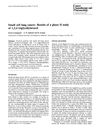 82 citations,
January 2000 in “Hormone Research in Paediatrics”
82 citations,
January 2000 in “Hormone Research in Paediatrics” DHEA stimulates skin oil glands and could help postmenopausal women, with potential for acne and excessive hair growth treatments.
 33 citations,
September 2012 in “Australasian Journal of Dermatology”
33 citations,
September 2012 in “Australasian Journal of Dermatology” Chemotherapy can cause hair changes similar to alopecia areata, which might lead to misdiagnosis.
 32 citations,
January 2017 in “Patient Preference and Adherence”
32 citations,
January 2017 in “Patient Preference and Adherence” Alopecia affects patients' quality of life, with younger patients and longer-lasting hair loss experiencing greater impact.
 11 citations,
August 2000 in “Journal of Endocrinology”
11 citations,
August 2000 in “Journal of Endocrinology” DHEA acts like a male hormone on rat skin glands and doesn't turn into female hormones there.
 6 citations,
May 1986 in “Cancer Chemotherapy and Pharmacology”
6 citations,
May 1986 in “Cancer Chemotherapy and Pharmacology” The drug TGU was ineffective against small cell lung cancer and caused significant bone marrow suppression.
 5 citations,
January 2016 in “Skin appendage disorders”
5 citations,
January 2016 in “Skin appendage disorders” A rare skin condition called linear lichen planopilaris caused itchy red bumps and hair loss on a man's face.
 3 citations,
January 2016 in “Skin appendage disorders”
3 citations,
January 2016 in “Skin appendage disorders” Possible causes of female hair loss include androgenetic alopecia, telogen effluvium, cicatricial alopecia, and alopecia areata incognita; diagnosis and treatment require dermoscopy and histopathology.
 3 citations,
February 2005 in “Journal of Quantitative Spectroscopy & Radiative Transfer/Journal of quantitative spectroscopy & radiative transfer”
3 citations,
February 2005 in “Journal of Quantitative Spectroscopy & Radiative Transfer/Journal of quantitative spectroscopy & radiative transfer” Iron and zinc levels in hair are not linked to hair loss from chemotherapy.
 1 citations,
September 2011 in “UHOD : Uluslararası hematoloji - onkoloji dergisi”
1 citations,
September 2011 in “UHOD : Uluslararası hematoloji - onkoloji dergisi” Looking at tissue characteristics isn't reliable for telling apart basal cell carcinoma from certain benign skin tumors.

Deleting Smad4 and PTEN genes in mice causes rapid, invasive stomach cancer.










